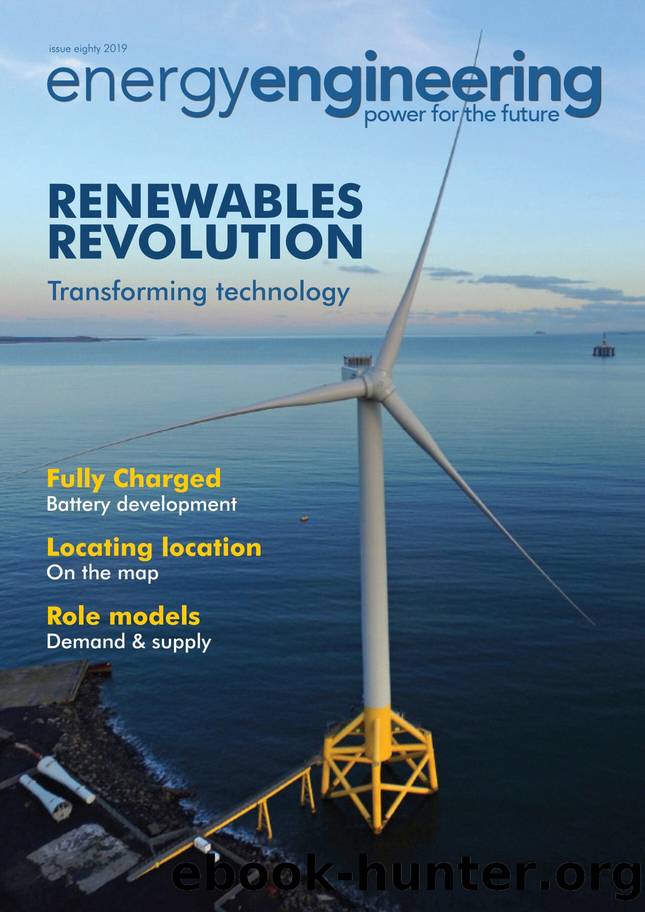Energy Engineering: Power for the future by Winster Craig

Author:Winster, Craig [Winster, Craig]
Language: eng
Format: epub
Publisher: UNKNOWN
Published: 2020-04-30T16:00:00+00:00
facing the Battery Tech sector and how do you think they should be dealt with?
JP: There is still uncertainty about what direction the industry will take which makes investment decisions more difficult. There are many variations of battery cell formats being used by different OEMs, so the challenges of moving towards standardisation or using bespoke formats and chemistries as a differentiator will be a consideration for the future which will develop over time.
One of the aspects that UKBIC will help to address is the challenge of manufacturing new technologies in high volume whilst maintaining the standards of quality, performance and robustness required from the automotive industry. Operation in vehicles is a demanding environment for batteries and the quality of the manufacturing process is absolutely critical for ensuring that the resulting cells perform safely and as expected. Performance and quality of cells can be affected by a number of production issues such as crosscontamination of materials or managing process variation at high speeds. This is why it is important that companies have an opportunity to come and trial and validate their products and components at relevant speeds and scales in a place like UKBIC, before being required to commit to very costly investments in their own production facilities. If we can enable more technology developers to validate their products and processes at scale, there will be more opportunities to reduce the risk of onward
investment and increase commercial confidence.
DM: If you had a wish list to ensure the UK can keep at the forefront of battery technology what would be on it? JP: I look forward to launching
UKBIC in 2020 as it will be a very important asset for the UK to
enable opportunities for scale-up and commercialisation. We already have an excellent science and
technology base in the UK, which is working on the future generations of battery technologies that could bring about step changes in cost, safety, performance or lifecycle. It is more an expectation than a wish that, with the Faraday Battery Challenge work, we can provide much more opportunity for these technologies to develop all the way through to being volume manufactured in the not too distant future.
www.ukbic.co.uk
Fast track
Steve Welch spoke to Rob Millar Head of Electrical and Battery Systems at Williams Advanced Engineering about their story from racetrack to road, detailing how their technology has evolved during this journey and how they also maintain some aspects of the race approach, such as rapid prototyping
Rob Millar Head of Electrical and Battery Systems at Williams Advanced Engineering
Download
This site does not store any files on its server. We only index and link to content provided by other sites. Please contact the content providers to delete copyright contents if any and email us, we'll remove relevant links or contents immediately.
| Automotive | Engineering |
| Transportation |
Whiskies Galore by Ian Buxton(41997)
Introduction to Aircraft Design (Cambridge Aerospace Series) by John P. Fielding(33122)
Small Unmanned Fixed-wing Aircraft Design by Andrew J. Keane Andras Sobester James P. Scanlan & András Sóbester & James P. Scanlan(32797)
Craft Beer for the Homebrewer by Michael Agnew(18238)
Turbulence by E. J. Noyes(8041)
The Complete Stick Figure Physics Tutorials by Allen Sarah(7366)
The Thirst by Nesbo Jo(6935)
Kaplan MCAT General Chemistry Review by Kaplan(6930)
Bad Blood by John Carreyrou(6614)
Modelling of Convective Heat and Mass Transfer in Rotating Flows by Igor V. Shevchuk(6434)
Learning SQL by Alan Beaulieu(6282)
Weapons of Math Destruction by Cathy O'Neil(6268)
Man-made Catastrophes and Risk Information Concealment by Dmitry Chernov & Didier Sornette(6011)
Digital Minimalism by Cal Newport;(5751)
Life 3.0: Being Human in the Age of Artificial Intelligence by Tegmark Max(5551)
iGen by Jean M. Twenge(5409)
Secrets of Antigravity Propulsion: Tesla, UFOs, and Classified Aerospace Technology by Ph.D. Paul A. Laviolette(5369)
Design of Trajectory Optimization Approach for Space Maneuver Vehicle Skip Entry Problems by Runqi Chai & Al Savvaris & Antonios Tsourdos & Senchun Chai(5066)
Pale Blue Dot by Carl Sagan(4997)
